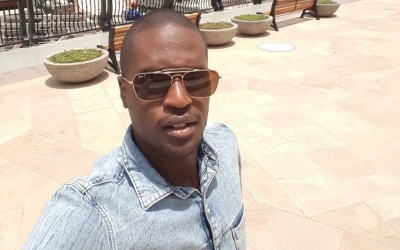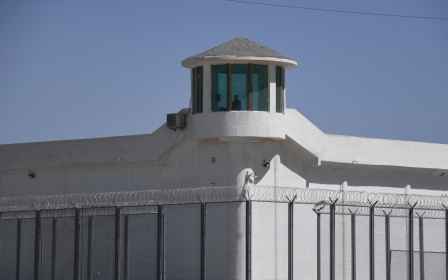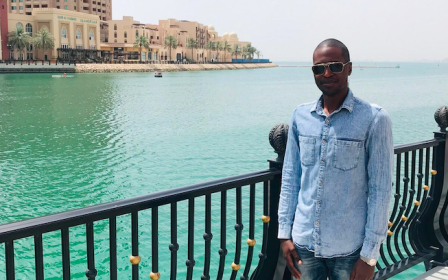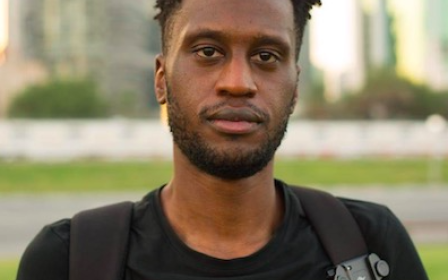Qatar World Cup: Kenyan labour rights activist 'detained and deported'
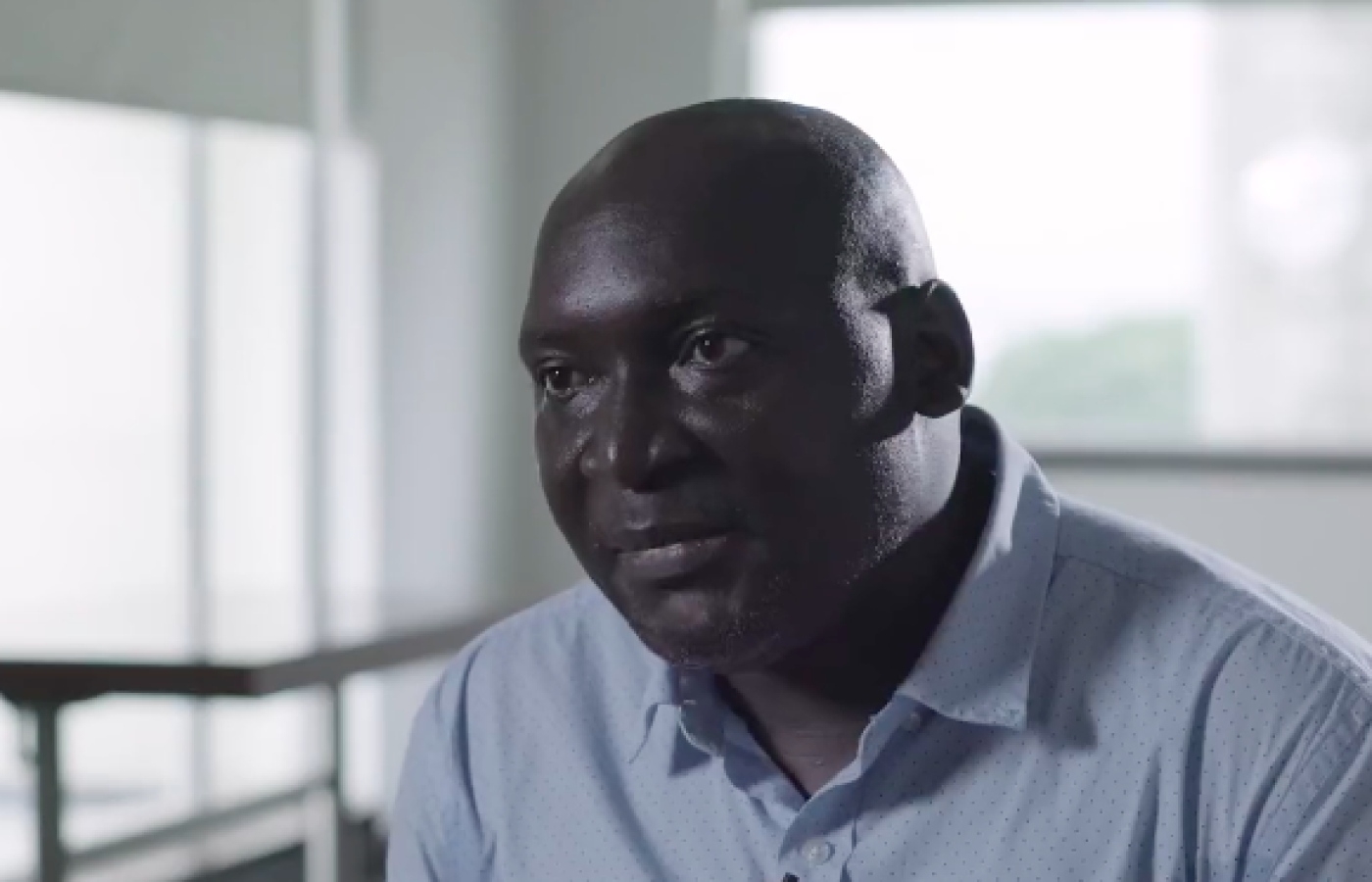
A former safety inspector at Qatar’s Lusail Stadium, where the World Cup football tournament will kick off next month, has described how he was detained and deported from the Gulf state over his advocacy for better conditions for migrant workers.
Geoffrey, a Kenyan workers’ rights activist, told Middle East Eye he was arrested in a night raid by Qatari police, held for eight days and then deported in June.
Before his deportation, he had been working as an investigator for Equidem, a London-based NGO investigating rights abuses.
In four years in Qatar, the 49-year-old said he had also worked as a security guard and a safety inspector at Lusail, which will also host the World Cup final on 18 December, and Al Janoub Stadium, another World Cup venue.
Speaking to MEE from his home in Nairobi, Geoffrey, who wished not include his surname, said he remains inundated with hundreds of messages from workers in Qatar and across the Gulf seeking help.
Stressing that he had never broken the law, Geoffrey said he had been “harassed” by the Qatari authorities and decided to speak about his case to send a warning to rights groups and football governing bodies before the World Cup.
"The work I did was not activism. It was awareness and showing workers what rights they are entitled to," Geoffrey told Middle East Eye.
'Complete isolation'
Recounting the moment Qatari police detained him, Geoffrey said they arrested him in his shorts "in the middle of the night" and then took him to a deportation centre.
"When they arrest you, you are in complete isolation, and your phones are taken away from you," said Geoffrey.
He told MEE he feared he would face the same fate as Kenyan rights activist Malcolm Bidali, who was held in solitary confinement for three weeks.
"For eight days, I was detained. My family were searching for me and it was so traumatising for them and for me, because I was worried about what they will do to me.”
Mustafa Qadri, executive director of Equidem, condemned Geoffrey's deportation and questioned Qatar's commitment to improving workers’ rights.
"If Qatar is genuine about protecting migrant worker rights, it should have been supporting labour activists like Geoffrey, rather than subjecting him to suspicion, ill-treatment in detention and threatening to prosecute him," Qadri told Middle East Eye.
"Yes, a number of international trade union bodies are set up in Qatar, but their members working there operate in an environment of significant restriction and the ever-present risk of being harassed by employers or even prosecuted by the authorities if they are seen to be organising workers, as freedom of association remains a crime in the country."
Most of Qatar’s World Cup stadiums – and much of the country’s supporting infrastructure – have been built at pace in the little more than a decade since it was awarded the tournament in 2010.
But the buildup to the first World Cup in the Middle East has been beset by reports of poor working conditions and rights abuses afflicting the millions of migrant workers on whom the Gulf state’s construction projects depend.
'Abuses on a significant scale'
In a report on Thursday, marking one month until the beginning of the tournament, Amnesty International said that migrant workers in Qatar “continue to face abuses on a significant scale”.
It noted that thousands of workers employed on World Cup-related projects had benefited from improved working and living conditions over the past decade. It acknowledged that elements of the kafala sponsorship system – which tied workers to a specific employer and placed restrictions on their freedom to leave the country – had been dismantled.
But it said thousands of workers’ deaths since 2010 remained unexplained, with hundreds of them likely to be linked to exposure to Qatar’s extreme heat in many months of the year.
Steve Cockburn, Amnesty International’s head of economic and social justice, said: “Although Qatar has made important strides on labour rights over the past five years, it’s abundantly clear that there is a great distance still to go.
“Thousands of workers remain stuck in the familiar cycle of exploitation and abuse thanks to legal loopholes and inadequate enforcement.”
In August, Middle East Eye reported that Qatar had deported dozens of workers who held a rare protest over unpaid salaries. Equidem told MEE that at least 60 people detained by Qatar had been deported back to their country of origin.
Workers and trade union representatives told Migrant Rights, a rights group focused on worker's rights in Gulf countries, that the company had promised to give them their salaries on 11 August.
But when they were denied their wages and had the electricity cut from their company-owned accommodation, the workers went on strike. At least 200 workers took to the streets of Doha on 14 August to demand their unpaid wages.
Since being awarded the World Cup tournament, Qatar has been under intense pressure to reform its labour rights and ban the exploitative kafala system.
But despite making strides in labour reforms, migrant workers in Qatar are still banned from joining trade unions and participating in strikes.
Last year, hundreds of migrant workers in Qatar went on strike to protest poor working conditions, unpaid and delayed wages, and threats of reduced wages.
Qatari officials had not responded at the time of publication to requests for comment about Geoffrey’s detention and deportation.
'Meaningful and sustainable progress'
Responding to Amnesty’s report on Thursday, the Qatar's Supreme Committee for Delivery and Legacy (SC), which is organising the tournament, said: “The advancements in workers’ welfare is a legacy we are very proud of, and one that we are already seeing in action.
"We have always believed that the World Cup will be a catalyst to accelerate positive initiatives, leaving a legacy of meaningful and sustainable progress for the country and region."
The committee said progress on workers’ rights had been recognised by the United Nations’ International Labour Organisation and by the Building and Wood Workers’ International (BWI) trade union, adding that it welcomed Amnesty’s recognition of improved working and living conditions for some workers.
“Work is ongoing and there is of course still room for improvement," the SC said.
"We are continuing to explore alongside key partners the opportunities to enhance the legacy that improves the lives of workers and lays the foundation for fair, sustainable and lasting reforms.”
Middle East Eye propose une couverture et une analyse indépendantes et incomparables du Moyen-Orient, de l’Afrique du Nord et d’autres régions du monde. Pour en savoir plus sur la reprise de ce contenu et les frais qui s’appliquent, veuillez remplir ce formulaire [en anglais]. Pour en savoir plus sur MEE, cliquez ici [en anglais].


